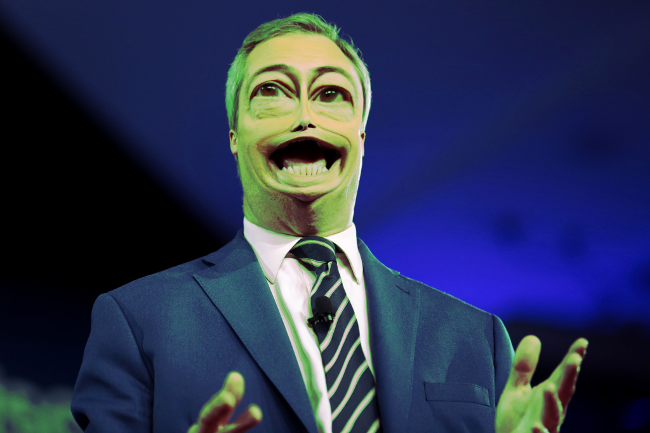As long as humans live there will always be an instinct to smother dislikeable ideas. And it’s unsurprisingly that some progressives have been emboldened in that pursuit by the sacking of comedian Danny Baker, after he unwittingly made a joke that could be interpreted as racist about the latest Windsor sprog.
That same Thursday many noticed that Nigel Farage, former Ukip leader and now leader of the Brexit Party, was due to appear on Question Time. Nesrine Malik, a Guardian columnist, put it starkly: “Since sacking Danny Baker only yesterday the BBC has hosted Melanie Phillips, Nigel Farage, and now the actual Ben Shapiro.”
You’ll note that Farage, Times columnist Phillips and US conservative pundit Shapiro are all rightwing. And while the increasing prominence of Jeremy Corbyn-backing Novara Media pundits on mainstream TV has raised some quibbles, calls to blacklist people from public spaces like BBC current affairs shows seem largely directed by lefties against those on the right. This is at a time when the left is culturally dominant.
Calls to give Farage less airtime have been made as long as he’s been aired. On Ukip’s way up many complained that Nige was saying too much on TV, the risk being that people might find it persuasive.
This later dovetailed with the view that Brexiteers were insufficiently challenged during the referendum campaign, or that “village idiots” advocating leave were pitted against credible remain boffins, to partially quote Gavin Esler, former Beeb hack and current candidate for the Change It Back party.
Media coverage certainly matters, but it’s not obvious how it works. Farage rose to prominence through the mainstream media, but Dominic Cummings, campaign chief for Vote Leave, saw him as a liability, putting off potential leave voters that found his politics too toxic.
I suspect that the lack of a leftwing case for leaving the EU during the referendum was partly attributable to Farage’s influence, as evinced by Graun columnist Owen Jones’s shifting position on Lexit. Another hack at that paper once told me he’d have liked to vote leave, but didn’t want to encourage Farage’s broader politics.
Arguments about what views can be broadcast or printed say a lot about how elites feel about the publics they are supposed to represent. The implicit view of those who think Farage is too dangerous to air is that there are too many viewers who are too stupid, ignorant or irrational to be trusted to hear him.
No doubt there are Brits who are all of those things. But as the economist Bryan Caplan argued in The Myth of the Rational Voter, being ignorant is not the same as being impressionable. We are all sceptical about information that threatens notions we are emotionally invested in. When someone finds Farage persuasive, it is probably because they were already sympathetic.
The broader problem with censoring certain ideas in democracy is that by definition we are debating which policies are beneficial, and to whom. Farage’s view on migration, to take one example, would certainly spoil the prospects of some who seek to come to the UK. Whether this is outweighed by the alleged benefits to UK residents is the entire debate.
All countries have at times outlawed certain ideas, Western nations recently doing it through the idea of hate speech. For many people Farage’s infamous “breaking point” poster – described by some as racist – qualified. Some probably think his presence on TV is an act of aggression towards ethnic minorities.
But I am sceptical about banning these things, because I do not trust anyone to set the rules. As evinced by the past week, some progs seem to believe if only rules on speech were set as they’d like we’d adopt their preferred policies. This in itself is an excellent reason not to give them that power.
Image based on Nigel Farage, February 2014 by Gage Skidmore
